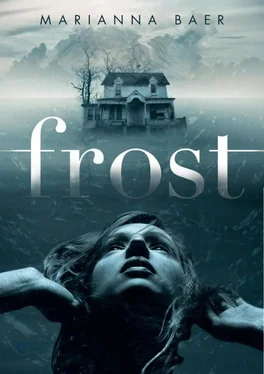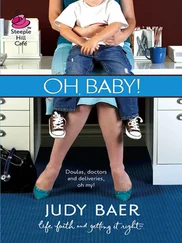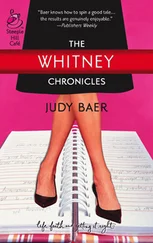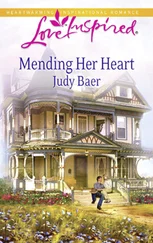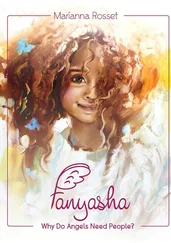“Oh, right.” I brushed a loose section of hair behind my ear, almost stabbing myself in the eye with the screwdriver. “Well, the good thing about teaching is that I feel like I can major in lots of things and go into it. But if I want to be an architect or a psychiatrist, it’s more … complicated. I feel like I’d have to decide soon.”
“You’d want to go to med school?” he said.
“So I could write prescriptions. I know therapy helps, too. Obviously, it’s hugely important. But so much of everything is chemical.”
I began turning the next the screw into the window frame. “Like schizoaffective disorder. Therapy can only do so much, right? It’s all about neuroscience and”—I almost said genetics— “and biology.” The wood splintered, the bracket broke off and clattered to the floor. “Damn.”
“It’s not like science has done anything great for my dad,” he said as I stepped off the chair and scanned the floor for hardware. “Jesus. I don’t know if he’s better when he’s on or off his meds. Well, no. That’s not true. But he’s bad in different ways.”
“But new drugs are coming out all the time.” I bent over to grab the bracket and screw, then stood and faced David. “Eventually, you know, in the future, mental illness won’t even exist. Not in our lifetime, I guess. But eventually.”
“I think we’ll just make new problems as we fix the ones we have.”
“You and Celeste aren’t big on medication, are you?” I still couldn’t understand why she’d choose insomnia over Tylenol PM.
“I guess we’re kind of cynical.” David said. “We’ve gotten our hopes up too many times. But, I mean, of course if something happened to her, or to me, I’d be happy there were options.”
“Do you … is that … is it something you guys talk about? You know, the possibility … ?”
He nodded. “We have a pact.”
“A pact?”
“Sometimes, when people first get sick, they know something’s wrong but are scared to talk about it. Celeste and I have a pact so if one of us ever starts … I don’t know, worrying about thoughts we’re having, we’ll tell the other one.”
He sounded sweet, but kind of naïve, until he added, “Of course, there’s not much I could do to help her, at that point. But at least I could keep her from doing something, you know, desperate.” He paused. “My dad has. A couple times.”
“I don’t blame him.” After I said it, I realized how awful it must have sounded. “I mean, stuff must be so difficult for him.”
“Not everything,” David said in a flat voice.
“I tried, in eighth grade,” I said. “And I’m sure my life wasn’t nearly as hard.”
The words hit the air before I could stop them.
“I didn’t really try,” I added quickly. Had I just compared my immature stupidity with his father’s serious mental illness? “I took a bunch of pills,” I said, “but I threw them up. I didn’t almost die, or anything. I’m sorry. I shouldn’t have made that connection. It wasn’t that big a deal.”
“Sounds like a big deal,” he said. “What happened?”
“Well,” I started, my heart suddenly pounding. Why had I mentioned this? “Like I said, I think stuff can be really … physically based. My body was going through hormonal changes, my chemistry was all screwed up, and my parents were getting a divorce and I just kind of lost it.”
“The divorce was messy?”
“No,” I said. “They didn’t even use lawyers.”
“So—”
“They were making me decide if I wanted to stay in Cambridge with my dad or move to LA with my mom.”
“As a thirteen-year-old?” he said. “Of course you were upset. Nothing to do with hormones.”
“People’s parents get divorced every day,” I said, “and it doesn’t make them want to kill themselves. I mean, my parents both wanted me. I got much better after I was on antidepressants for a bit.”
“Who did you pick?”
I wiped my forehead and rested my hands on my hips. “Neither. I was close to both of them and didn’t want to … you know, choose one over the other. So in ninth grade, I came here. Some vacations I go to LA, some I go to Cambridge. Sometimes I go to Abby’s family.”
“That’s kind of sad,” David said.
“It’s not,” I said. “It was the perfect solution. During the school year, my friends are my family.”
“There’s a big difference between friends and family.”
“Thank God,” I said. “Friends you can choose .”
I smiled, but instead of smiling back, David’s expression hardened like cement. So did his voice. “I’d choose my dad and Celeste,” he said. “Over anyone. And I always will.”
“Oh. Of course.” Blood rushed up my neck and flooded my cheeks. “I didn’t mean that. I was talking about myself, about my own family. Not about yours.”
It took a couple of seconds for his face to soften. “Sorry,” he said. “I just assumed.”
“That’s okay.” I stepped back up on the chair and refocused on hanging the shades, something I knew how to do. My hands trembled.
We worked for a while in unsettled silence. I couldn’t believe how many stupid things I’d said. I wasn’t usually so tactless. After a few minutes, I asked, “Would you mind if we listened to my bio lecture?”
David didn’t answer right away. “It’s not you,” he finally said, keeping his eyes on what he was doing. “I’m just so used to being defensive about my family. But you’ve been so cool about Celeste moving in here, hanging these blinds for her, and you’re not all freaked out about my dad, like people get. I appreciate it.”
I could tell that this was a major thing for him, protecting his family. I guessed maybe he’d had to take his dad’s place, in some ways.
“Thanks,” I said. “I appreciate … your appreciation.” Really? That’s the best you could do?
Now he looked at me and smiled. “And I appreciate your appreciation of my appreciation.”
“That’s so sweet.” I put a hand on my heart. “I appreciate your appreciation of my appreciation of your appreciation.”
We laughed—holding eyes. As I stared, something moved behind him. I looked just in time to see the photo he’d hung fall right off the wall, onto the bed. It landed with a clatter as the Plexiglas jostled in the frame.
David turned. “Oops,” he said.
Because we’d smoothed over the tension between us, I allowed myself a little dig. “I think, maybe, it’s better if you leave the home-improvement projects to me.”
After David left, I couldn’t settle down to homework quite yet—the conversation had been too intense and now I had too much on my mind. I decided to see if there was anything I could do to fix Celeste’s closet door. She kept having trouble opening it, and I didn’t know if it was a problem with the knob, or if the wood was swelling.
I tried the handle and the door opened smoothly. I turned the knob back and forth, looked at the movement of the latch. It seemed fine. I shut the door and opened it again, seeing if the wood stuck. It didn’t. I couldn’t tell what the problem was. I leaned my back against the doorframe, shut my eyes, and breathed in. My skin tingled. Then the emotion—that sense of contentment, safety—penetrated my cells. It’s weird, how scents can be so powerful. My mother once told me that smells are key to selling a house. Freshly baked bread, cinnamon, and coffee are best, she’d said.
The day I came home from school in eighth grade and our own house smelled of baking bread, I wanted to vomit. Instead, I ran upstairs, to the one place the smell couldn’t reach.
Wait a minute.
I breathed in again.
Читать дальше
